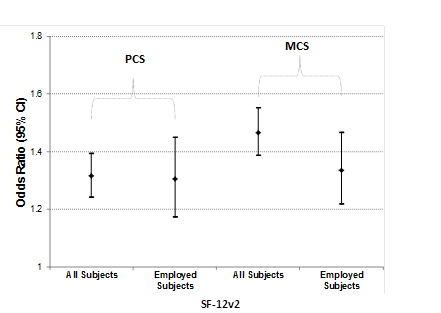Session Information
Session Type: ACR Poster Session C
Session Time: 9:00AM-11:00AM
Background/Purpose: Evaluating health-related quality of life (HRQoL) scores is a key component of the management of rheumatoid arthritis (RA) and evaluation of treatment efficacy. There is a need to further understand how observed differences in these scores translate into impact on work-related outcomes. The objective of these analyses was to establish a quantitative link between reported HRQoL and work outcomes of RA patients.
Methods: Patient data was obtained from 2 independent databases: QualityMetric’s 2009 PRO Norming Survey (QMPRONS) and the Medical Expenditure Panel Survey (MEPS). Physical and Mental Component Summary (PCS and MCS) scores of Short Form-12v2 Health Survey (SF-12v2; captured in MEPS) and Short Form-36v2 Health Survey (SF-36v2; captured in QMPRONS) assessed HRQoL. Work outcomes were evaluated using the following endpoints: inability to work due to disability, lost days of work/housework, self-rated job performance, and presence of serious cognitive difficulties. Logistic regression models analyzed binary outcomes (inability to work, self-rated job performance [low vs medium/high], and presence of cognitive difficulties). A zero-inflated Poisson model was used to analyze the relationship between HRQoL and lost days of work/housework. A 5-point difference was used to illustrate the impact of lower HRQoL on work outcomes.
Results: Lower PCS and MCS scores were significantly associated with inability to work due to health (lower PCS: odds ratio [OR], 2.42; 95% confidence interval [CI], 2.14-2.74; lower MCS: OR, 1.40; 95% CI, 1.28-1.52; both P <0.0001). Furthermore, lower SF-12v2 summary scores were significantly associated with increased numbers of missed days of work/housework (lower PCS: 4.4 vs 1.3 missed days for scores of 40 vs 45, respectively; P <0.0001; lower MCS: 3.6 vs 1.6 missed days for scores of 40 vs 45, respectively; P = 0.0002). For SF-36v2 MCS, a lower score was associated with greater odds of low job performance among employed patients (OR, 1.58; 95% CI, 1.34-1.85; P <0.0001), although a lower PCS score did not significantly increase odds of reporting low job performance. Lower SF-12v2 scores were significantly associated with increased risks for serious cognitive difficulties in both employed and all patients (all P <0.0001; Figure).
Conclusion: Low physical and mental health is associated with an increased inability to work and increased number of missed days of work. These analyses demonstrate that lower scores significantly impact work outcomes and underscore the importance of both summary measures in terms of measuring the impact of RA.
Figure. Increase in the odds of presence of cognitive difficulties associated with a 5-point lower SF-12v2 score.
SF-12v2, Short Form-12v2 Health Survey; PCS, physical component summary; MCS, mental component summary; CI, confidence interval.
To cite this abstract in AMA style:
Strand V, Kosinski M, Rendas-Baum R, Brooks D, Ganguly R. Real-World Evidence Linking Health-Related Quality of Life to Work Outcomes in Patients with Rheumatoid Arthritis [abstract]. Arthritis Rheumatol. 2017; 69 (suppl 10). https://acrabstracts.org/abstract/real-world-evidence-linking-health-related-quality-of-life-to-work-outcomes-in-patients-with-rheumatoid-arthritis/. Accessed .« Back to 2017 ACR/ARHP Annual Meeting
ACR Meeting Abstracts - https://acrabstracts.org/abstract/real-world-evidence-linking-health-related-quality-of-life-to-work-outcomes-in-patients-with-rheumatoid-arthritis/

